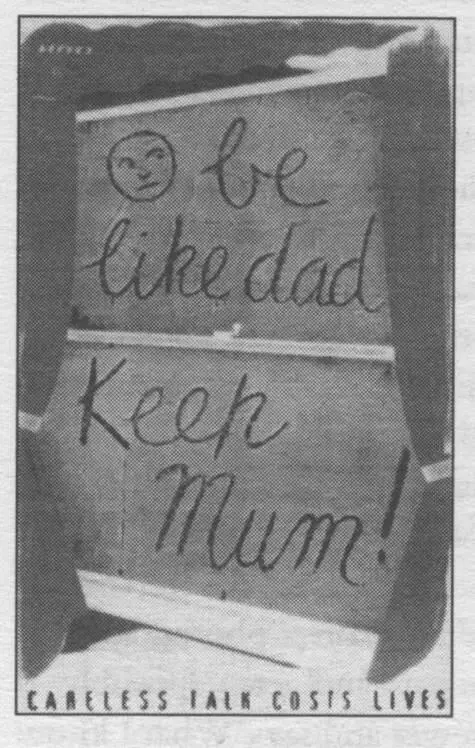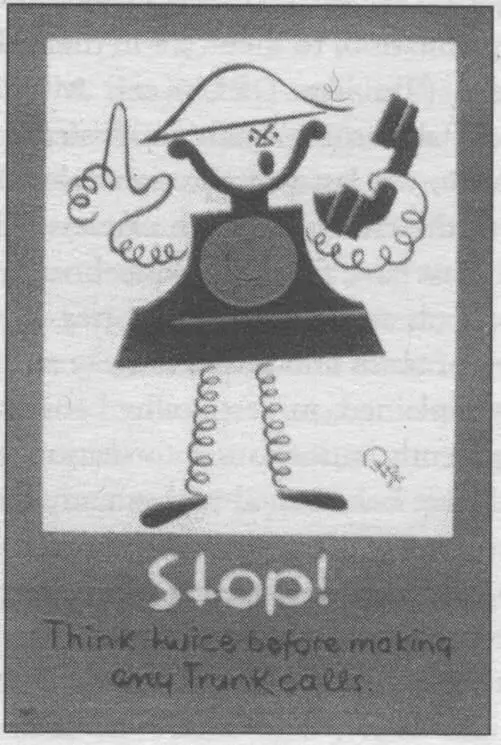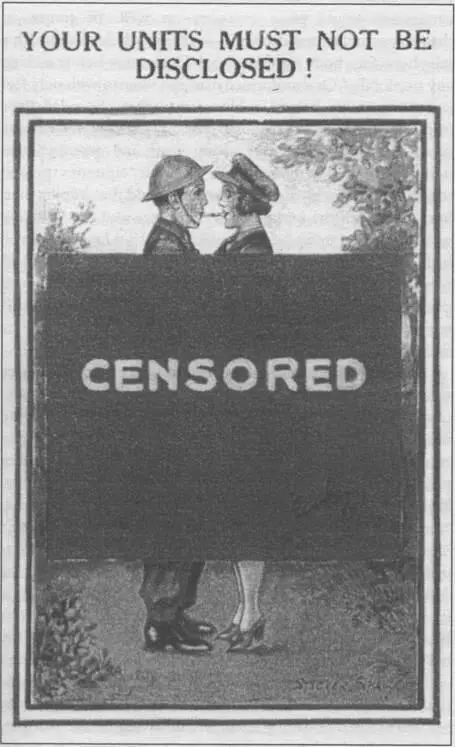



why it was not possible to explain). And there were still more posters addressed to the members of the armed forces, whose carelessness could place everyone, as well, of course, as themselves, in greatest danger. A soldier in a helmet and with a telephone for a body warned: 'Stop! Think twice before making any trunk calls.' Or a uniformed man and woman with only feet and head visible behind a blue screen that concealed their respective ranks and was emblazoned, in white letters, with the word 'CENSORED'; the young man and woman were standing with the lighted ends of their cigarettes pressed together, one was giving the other a light and thus joining their lips, albeit with the interposition of tobacco and fire (smoking wasn't frowned upon or persecuted then, so things weren't all bad), but, they were warned: 'Your units must not be disclosed!' Most of the posters insisted, however, on the fundamental campaign slogan: 'Careless talk costs lives', 'Las conversaciones imprudentes cuestan vidas'. Although another not entirely unfaithful translation might be: 'se cobran vidas'.
'I have a vague recollection that during our Civil War there were similar warnings against fifth columnists, but I'm not sure, can you remember, Peter?' I asked. 'There's a slogan going round in my head along the lines of "The enemy has a thousand ears", but I may be inventing it, I'm not sure, on the other hand, I haven't any images stored away, any equivalents to the kind of thing you've shown me, I can't remember ever having seen them reproduced.' I really didn't know, but it wasn't impossible that this was another initiative we had exported. Or perhaps I was getting it confused in my memory with the defamatory poster against the POUM in the spring of 1937, a face stamped with a swastika appearing from beneath a mask bearing the hammer and sickle; Nin had been the victim of the half-justified paranoia that made people see Franco's spies and collaborators on every corner, or, rather, his enemies had made use of that paranoia to accuse him of treachery and espionage. He was accused of having informed, of having talked, and that, paradoxically, is what his torturers could never force him to do.
He remained silent and did not save himself, he kept his mouth shout, he did not blab, he did not say a word, in short, 'he kept mum', what he knew he kept to himself or under his hat, or perhaps he said nothing because the accusations were all false, he would have had to invent some tall tales and stories in order to acknowledge and support them, to admit that he was the 'Trojan horse' as that poetic 'lover of the truth' and 'worthy Don Quixote' later described him in that 'lamp-light glow' of a voice which so bewitched Trapp-Tello, such a very slanderous voice.
'Last night I told you that before the war against Germany I had been briefly involved in yours, and I usually express myself with great precision, Jacobo. And I believe I am now. That means, I did not spend much time in Spain. I was just passing through,' Wheeler replied, and I noticed a slight touch of impatience in his voice, as if he were rather put out that I should, at that precise moment, want to drag in another war and another time, however closely related it was to his war and however close in time it might have been. 'But anyway, although I couldn't swear to it, I can't remember having seen such a thing in your country, I haven't read or heard anything about it either. If I'm not mistaken, though, there were posters, a campaign against fifth columnists; the populations of Madrid and Barcelona and possibly Valencia were urged to hunt them down and unmask them, to drag them out of the sewers and kill them, and it was the same on the other side: they were urged to track down and destroy intriguers, not that there would have been many left in an area full of talkative father-confessors, but that was what was asked of them. Obviously, they told people to keep their eyes open and to watch the rearguard, as they also did rather timidly, I believe, during the First World War, here and in France. But I don't think there was ever a campaign like this one against "careless talk", in which they not only put civilians on guard against possible spies, but recommended silence as the norm: people were prevailed upon not to speak, they were ordered, indeed, exhorted to keep silent. Suddenly people were made to see their own language as an invisible enemy, uncontrollable, unexpected and unpredictable, as the worst, most murderous and most fearful of enemies, like a terrible weapon which you, or anyone, could activate and set off without ever knowing when it might unleash a bullet, or if it would be transformed into torpedoes that would sink one of our battleships in the middle of the ocean thousands of miles away, or into bombs from a Junkers that would strike with deadly accuracy at our neighbourhoods and our houses, or fall on those military targets that most needed to be safeguarded and defended, on the most secret and most camouflaged and most vital of targets. I don't know if you quite realise what it meant, Jacobo: people were warned against using their main form of communication; they were made to distrust the very activity in which people most naturally indulge and always have indulged, without reserve, at all times and in all places, not just in this country and at that particular time; it made an enemy of what most defines and unites us: talking, telling, saying, commenting, gossiping, passing on information, criticising, exchanging news, tittle-tattling, defaming, slandering and spreading rumours, describing and relating events, keeping up to date and putting others in the picture, and, of course, joking and lying. That is the wheel that moves the world, Jacobo, more than anything else; that is the engine of life, the one that never becomes exhausted and never stops, that is its life's breath. And suddenly people were asked to turn it off, that engine, to stop it breathing. They were asked to give up the thing they most love, that is most indispensable to them, the thing we all live for and which everyone, without exception, can enjoy and make use of, both poor and rich, uneducated and educated, old and young, the sick and the healthy, soldiers and civilians. If there's one thing that they do or we do which is not a strict physiological necessity, if there is one thing that is truly common to all beings endowed with free will, it is talking, Jacobo. The fatal word. The curse of the word. Talking and talking, without stopping, that is the one thing for which no one ever lacks ammunition. Grammatical, syntactical and lexical skills matter little, oratorial gifts still less, and pronunciation, diction, accent, euphony, rhythm even less. The wisest man in the world will talk with greater order, appropriateness and precision, and perhaps to his listeners' greater advantage, or, rather, only to the advantage of those listeners who resemble him or want to resemble him. But he will not talk any more fluently than the semi-literate housewife who talks non-stop all day and who only stops at night because sleep and her sore, much-abused throat finally get the better of her. The most widely travelled man in the world will be able to tell endless marvellous and delightful stories, innumerable anecdotes about adventures in outlandish, remote, exotic and dangerous places. But he will not necessarily talk with any more confidence than the rough innkeeper who has never been further than his own bar and has only ever seen the twenty streets and two or three squares that make up his obscure village. The most inspired poet or the most zigzagging of narrators will be able to invent and recite on demand a stream of hypnotic words that will sound like music, so much so that those listening will not worry overmuch about the meaning, or, rather, they will capture the meaning effortlessly and without having to think about it before grasping or absorbing it, the process will be entirely simultaneous, although afterwards, when the music has stopped, those listeners might be quite incapable of repeating or summarising it, incapable possibly of continuing to understand what a moment ago they understood so well while they were rocked by the rhythm and while the enchantment lasted, resting as lightly upon the mind as upon the ear, each as permeable as the other. But those poets and narrators will not necessarily speak with more assurance or ease than the ignorant office worker, repetitive and dull, who believes himself to be full of "donaire" and "gratia", a tedious fixture in all the offices of the world, regardless of latitude or climate, even in the offices of interpreters and spies…'
Читать дальше
















